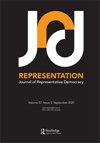The Responsibility of an Audience: Assessing the Legitimacy of Non-elected Representatives in Governance Networks
Q2 Social Sciences
引用次数: 3
Abstract
ABSTRACT Non-elected actors in governance networks are legitimate representatives when the constituency accepts their claims of representation. However, not all constituents have the resources to approve or oppose this representation. Consequently, I argue that the audience, often the decision-making authority, which enables non-elected actors to act as representatives has a responsibility to consider their legitimacy. Drawing on seven business and urban development networks in Norway, this article explores how the decision-making authority considers credibility, qualifications and connectedness to legitimise non-elected representatives in governance networks. Through interviews with civil servants and politicians organising and participating in the network, relevant documents and observations, this article demonstrates that the decision-making authority legitimises non-elected representatives based on credibility and qualifications rather than connectedness with the constituency. The decision-making authority believes that claims grounded in specialist expertise, self-representation and shared experiences with the constituency legitimise non-elected representatives. Similarly, truthful representatives are considered legitimate. Finally, the decision-making authority is divided with regards to how the interactive process between the non-elected representative and the constituency legitimises the content of the representation.受众的责任:评估治理网络中非民选代表的合法性
当选民接受他们的代表要求时,治理网络中的非选举行为者就是合法的代表。然而,并非所有选民都有足够的资源来批准或反对这种代表。因此,我认为,使非选举行为者能够作为代表的观众,通常是决策当局,有责任考虑他们的合法性。本文以挪威的七个商业和城市发展网络为例,探讨了决策当局如何考虑信誉、资格和连通性,从而使治理网络中的非选举代表合法化。通过对组织和参与网络的公务员和政治家的采访,相关文件和观察,本文表明决策当局基于可信度和资格而不是与选民的联系,使非选举代表合法化。决策当局认为,基于专业知识、自我代表和与选民分享经验的主张,使非选举产生的代表合法化。同样,诚实的代表被认为是合法的。最后,决策权在非选举产生的代表和选民之间的互动过程如何使代表的内容合法化方面存在分歧。
本文章由计算机程序翻译,如有差异,请以英文原文为准。
求助全文
约1分钟内获得全文
求助全文
来源期刊

Representation
Social Sciences-Sociology and Political Science
CiteScore
3.50
自引率
0.00%
发文量
31
期刊介绍:
This change in scope follows two paths. Firstly, it seeks contributors who are interested in exploring the interface between democratic practice and theory. In particular, this focus seeks contributions that apply theoretical insights to actual examples of current practice. Secondly, while not neglecting the current focus of the journal, we would like to expand its international coverage so that the journal will offer our readers insights in the state of democracy worldwide.
 求助内容:
求助内容: 应助结果提醒方式:
应助结果提醒方式:


